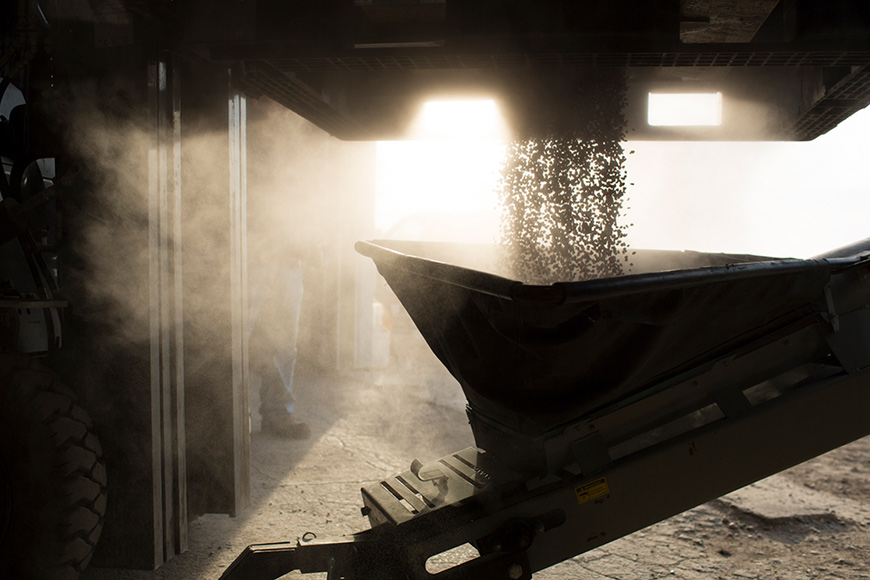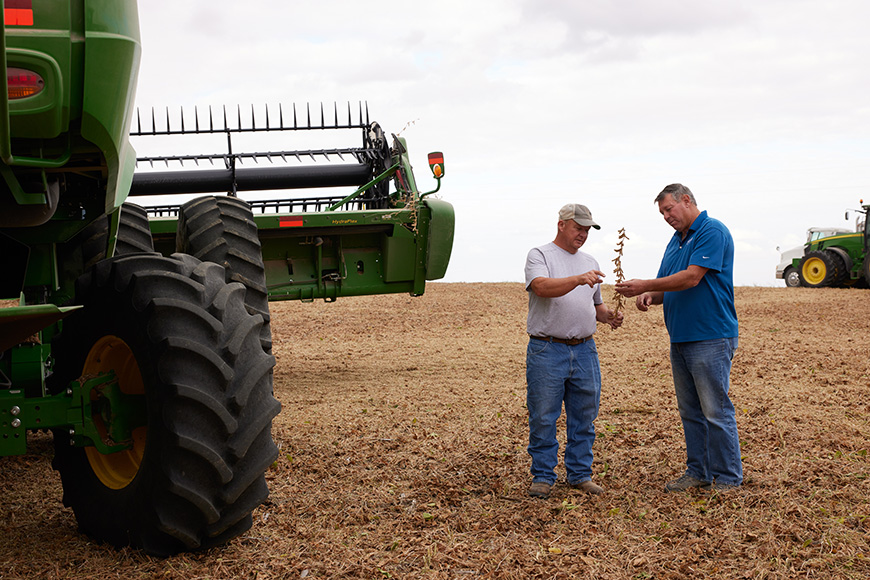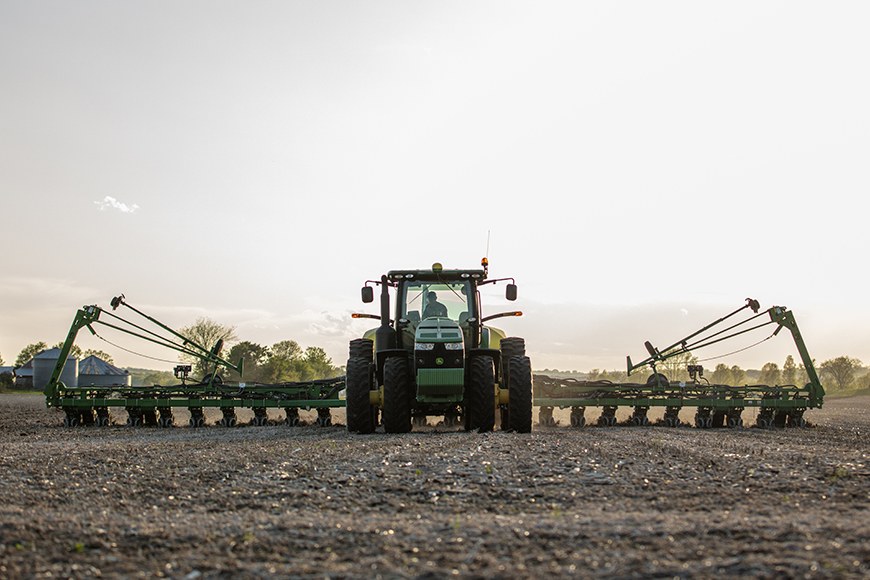5 Questions to Consider for 2021 Seed and Input Decisions

Selecting the right seed for the upcoming season is important, and you no doubt consider factors such as yield potential, soil type, population, fertility, standability and past performance when doing so. And though everyone wants the highest-yielding option, that particular hybrid or variety may or may not be right for your farm.
Finding the hybrid or variety that matches your operation is the single most critical factor in selecting seed, but it’s also critical to make seed decisions in concert with your broader farm management plan. Timing of seed purchases also factors into the equation. You may traditionally buy your seed later into the winter months. However, there are advantages to purchasing your seed earlier.
Sorting through these elements can be challenging. Here are five questions that can help guide your seed selection decisions for the 2021 season.
Remember that there are always new hybrids and varieties entering the market. Having a conversation with your agronomist about what’s being introduced in 2021 and whether it fits your farm allows you to reserve the most appropriate new products as part of your seed portfolio.
In addition, locking in the seed size that fits your planter is critical to getting a great start next spring. This will help you achieve planter singulation and uniform emergence across the field.
If the seed you purchase does not come treated, talk with your trusted advisor about the value a seed treatment can offer.
If you’re looking to assess how your selected hybrid will respond to certain inputs, Answer Plot data can help you to tie inputs to specific hybrids. Talk with your trusted advisor about using the characterization scores found in the WinField® United CHT Tool to see how various hybrids and varieties respond to different environments and management practices. You’ll also get sound, factual data to help match seed products with the most appropriate inputs, as well as with the soil types and yield environments that will offer them the greatest chances of success.
While there are many decisions still left to make this season, getting a head start on next year’s seed and input decisions can help you get the products you want and build a more holistic strategy for 2021. Talk with your locally owned and operated WinField United retailer or CROPLAN seed expert about how to match your operation to the appropriate seed products and crop inputs.
All photos are either the property of WinField United or used with permission.
© 2020 WinField United. Important: Before use, always read and follow label instructions. Crop performance is dependent on several factors beyond the control of WinField United, including without limitation soil type, pest pressures, agronomic practices and weather conditions. Growers are encouraged to consider data from multiple locations over multiple years and be mindful of how such agronomic conditions could impact results. Answer Plot®, CROPLAN®, Fortivent™ and WinField® are trademarks of WinField United.
Finding the hybrid or variety that matches your operation is the single most critical factor in selecting seed, but it’s also critical to make seed decisions in concert with your broader farm management plan. Timing of seed purchases also factors into the equation. You may traditionally buy your seed later into the winter months. However, there are advantages to purchasing your seed earlier.
Sorting through these elements can be challenging. Here are five questions that can help guide your seed selection decisions for the 2021 season.
1. How can making seed decisions in early fall help get the following season off to a stronger start?
Making seed decisions in the summer and at the beginning of fall may seem early, but there are advantages. The primary one is that usually the earlier you purchase, the greater the chances of being able to lock in the availability of the seed size and hybrid-trait or variety-trait combination you want. Also, while you won’t have harvest data to help inform your choice, many farmers have a good idea of what seed they want to plant again, based on data from previous years and how their current crop looks coming out of the ground.Remember that there are always new hybrids and varieties entering the market. Having a conversation with your agronomist about what’s being introduced in 2021 and whether it fits your farm allows you to reserve the most appropriate new products as part of your seed portfolio.
In addition, locking in the seed size that fits your planter is critical to getting a great start next spring. This will help you achieve planter singulation and uniform emergence across the field.
2. What about seed treatments?
Seed treatments should be considered in the seed selection process, and many companies include treatments right on the seed. But not all seed treatments are formulated with the same active ingredients, and it pays to know what’s on your seed. For example, CROPLAN® corn seed comes treated with Fortivent™ Zn seed treatment. WinField United data has shown a 4.8-bushel-per-acre advantage with Fortivent Zn seed treatment in testing across 41 Answer Plot® trial locations.If the seed you purchase does not come treated, talk with your trusted advisor about the value a seed treatment can offer.
3. How do response-to scores factor into the seed-selection equation?
These scores make all the difference. If I’m a grower, I’d rather have data-based information on what to spray or apply versus just crossing my fingers and hoping for the best. With tight budget margins, making the right management decisions and optimizing ROI potential and application efficacy are critical. Response-to scores are the foundation for optimizing return on your investments in seed, nitrogen and fungicide.4. Should I make decisions about crop inputs before or after I choose my seed?
I recommend making these input decisions after you choose your seed — the two main factors are fertility and fungicide. Preseason and in-season management of certain hybrids is vital. Some products respond more favorably to nitrogen and fungicide applications than others do. So, assessing each hybrid’s response to nitrogen and fungicide, then adjusting inputs in-season, is key to a hybrid’s success. It also allows you to better target your inputs, as well as your dollars. For example, if a hybrid you choose has a low response-to-nitrogen score, there may be little reason to apply any more than a baseline amount of nitrogen.If you’re looking to assess how your selected hybrid will respond to certain inputs, Answer Plot data can help you to tie inputs to specific hybrids. Talk with your trusted advisor about using the characterization scores found in the WinField® United CHT Tool to see how various hybrids and varieties respond to different environments and management practices. You’ll also get sound, factual data to help match seed products with the most appropriate inputs, as well as with the soil types and yield environments that will offer them the greatest chances of success.
5. What might I be forgetting to take into account in order to make well-informed decisions regarding my seed and inputs for 2021?
Stability and trust. I’d encourage farmers to include hybrid and variety stability as part of their decision-making process. Every seed company always has “the next best thing.” But having hybrids and varieties that are proven and stable over a two-year time frame is still an important part of the process. Finding an agronomist you trust, who is a student of the game and who knows individual hybrids and varieties inside and out is the type of ag professional who can help you optimize your return.While there are many decisions still left to make this season, getting a head start on next year’s seed and input decisions can help you get the products you want and build a more holistic strategy for 2021. Talk with your locally owned and operated WinField United retailer or CROPLAN seed expert about how to match your operation to the appropriate seed products and crop inputs.
All photos are either the property of WinField United or used with permission.
© 2020 WinField United. Important: Before use, always read and follow label instructions. Crop performance is dependent on several factors beyond the control of WinField United, including without limitation soil type, pest pressures, agronomic practices and weather conditions. Growers are encouraged to consider data from multiple locations over multiple years and be mindful of how such agronomic conditions could impact results. Answer Plot®, CROPLAN®, Fortivent™ and WinField® are trademarks of WinField United.




